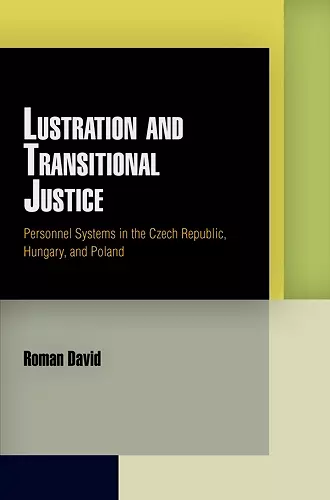Lustration and Transitional Justice
Personnel Systems in the Czech Republic, Hungary, and Poland
Format:Hardback
Publisher:University of Pennsylvania Press
Published:29th Aug '11
Currently unavailable, and unfortunately no date known when it will be back

Roman David analyzes major institutional innovations devised in Central Europe to deal with officials tainted by their complicity with prior regimes. He examines the historical origins, social meanings, and political effects of personnel systems based on dismissal, exposure, and confession in the Czech Republic, Hungary, and Poland.
How do transitional democracies deal with officials who have been tainted by complicity with prior governments? Should they be excluded or should they be incorporated into the new system? In Lustration and Transitional Justice, Roman David examines major institutional innovations that developed in Central Europe following the collapse of communist regimes. While the Czech Republic approved a lustration (vetting) law based on the traditional method of dismissals, Hungary and Poland devised alternative models that granted their tainted officials a second chance in exchange for truth. David classifies personnel systems as exclusive, inclusive, and reconciliatory; they are based on dismissal, exposure, and confession, respectively, and they represent three major classes of transitional justice.
David argues that in addition to their immediate purposes, personnel systems carry symbolic meanings that help explain their origin and shape their effects. In their effort to purify public life, personnel systems send different ideological messages that affect trust in government and the social standing of former adversaries. Exclusive systems may establish trust at the expense of reconciliation, while inclusive and reconciliatory systems may promote both trust and reconciliation.
In spite of its importance, the topic of inherited personnel has received only limited attention in research on transitional justice and democratization. Lustration and Transitional Justice is the first attempt to fill this gap. Combining insights from cultural sociology and political psychology with the analysis of original experiments, historical surveys, parliamentary debates, and interviews, the book shows how perceptions of tainted personnel affected the origin of lustration systems and how dismissal, exposure, and confession affected trust in government, reconciliation, and collective memory.
"In addition to meticulously distinguishing between the different personnel measures introduced in Poland, Hungary and Czechoslovakia, the great strength of David's book lies in his assessment of the meaning and consequences of bringing in particular forms of personnel systems." * Comparative European Politics *
"A ground-breaking exploration of lustration that provides a much-needed overview of its application in Central and Eastern Europe and delves into questions of the social impact of lustration practices. David provides concise and informed policy-relevant insights into the risks and potential benefits of three types of personnel systems and prescribes reconciliatory systems for divided societies." * International Journal of Transitional Justice *
- Winner of Winner of the 2012 Award for Concept Analysis from the International Political Science Association 2021
ISBN: 9780812243314
Dimensions: unknown
Weight: unknown
328 pages